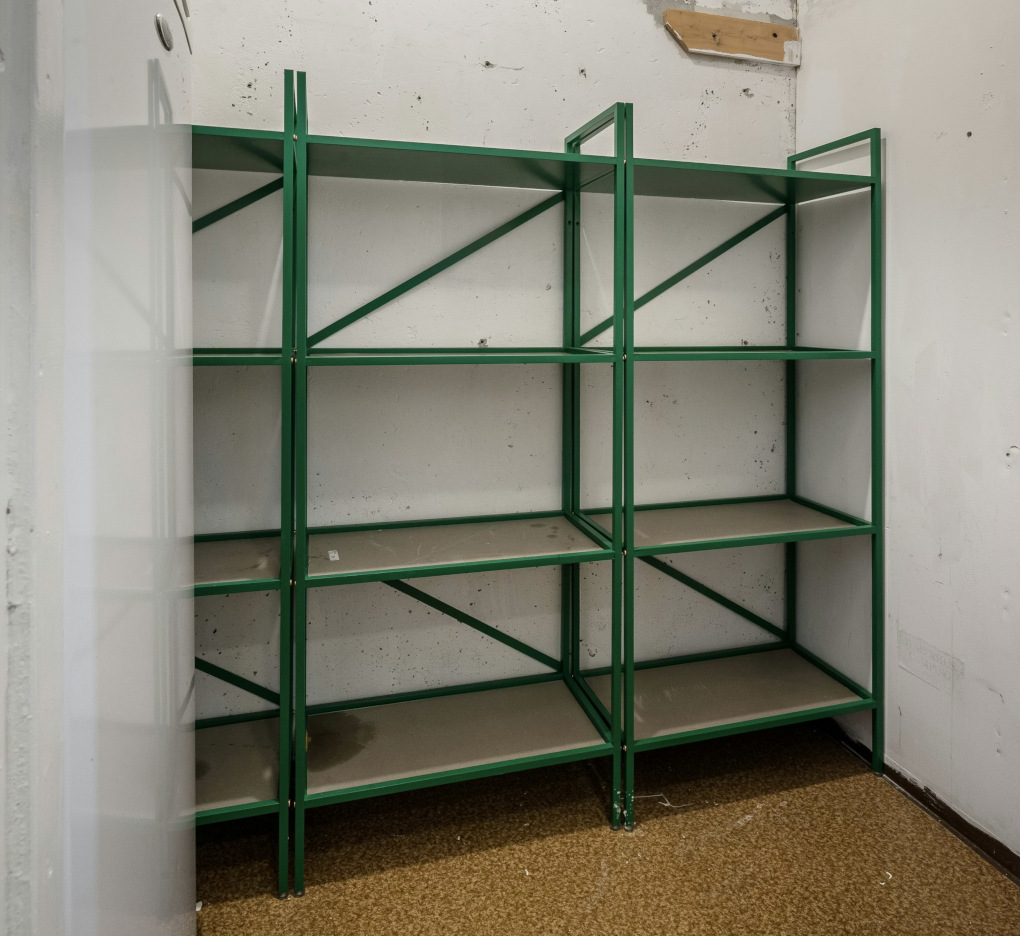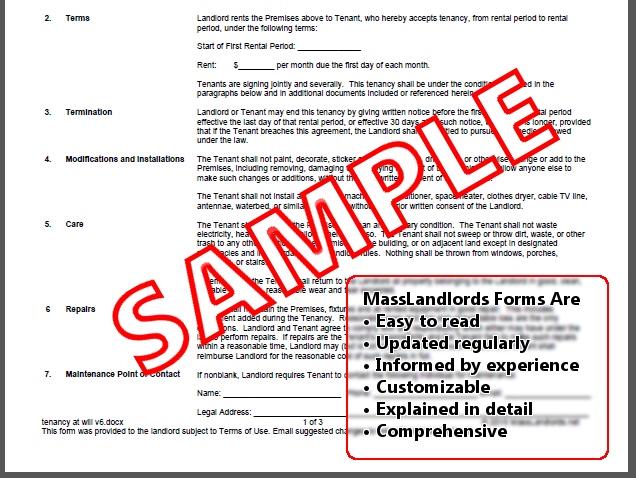Storage Agreement (Fixed Term)
The MassLandlords storage agreement for Massachusetts, first released October 2025, allows the owner of any storage space to rent it without having to include it in an apartment or home rental. The Parking Agreement compliments this storage agreement if the thing being stored is a vehicle. This is not a purely commercial storage agreement: a storage renter may be a business or a natural person. If a person, then consumer protection law would still apply. This agreement can stand alone and apart from any residential tenancy, or this agreement can be attached to a tenancy.

You can rent storage space in a residential building separately from a residential tenancy.
If you attach this form to a residential tenancy and blindly follow storage law, your actions could subject you to triple damages or criminal prosecution. The storage law permits things that landlord-tenant law does not. The form allows you to use storage law only if the form is used standalone apart from a residential tenancy. If the form is used as part of a residential tenancy, then some of the things it says you can do cannot be done. You cannot take a storage deposit. You cannot lock out a non-payor. It is up to you to read and follow the nonsubordination clause and the law. When in doubt, consult with an attorney.
Why We Created a Storage Agreement
A number of members are looking to rent storage spaces. A few YouTube channels were selling a lot of sizzle on storage, as well; we wanted to try to offer something Massachusetts-compliant.

Storage areas need not be fancy to meet market demand.
What does Massachusetts Law Say About Storage Agreements?
Massachusetts General Law Chapter 105A Sections 1 through 9 provide a process for how storage agreements work. Any member considering renting a storage unit should understand the requirements of the law first.
Compared to housing law, storage law is simple and draconian against renters who fail to pay. It is possible to boot a vehicle or otherwise remove access after rent is five days late (Section 5). It is possible to lock out a renter from the storage area; they retain a right to inspect (but not remove) their items. It’s interesting how different it is!
Is this a Standalone Agreement for Storage?
Yes, this agreement is not an addendum to any tenancy. It includes all terms that members directed us to incorporate. It has separate signature lines.
Does the Storage Agreement Work for Garage Parking?
No, if you want the renter to park one or more vehicles, use the Parking Agreement and specify your garage as the Space(s). This storage agreement is meant for storing non-vehicles.
If you want to give the renter the ability to both park and store non-vehicle objects (boxes, tools, whatever), then sign both a Parking Agreement and this Storage Agreement. The parking agreement and the storage agreement should carve out separate, non-overlapping rented spaces.
For example, a Parking Agreement can specify parking in the parking space of the garage, while a Storage Agreement signed alongside can specify the shelves along the wall. This way, the parking space may not be used for boxes and the shelves may not be moved to make room for the car. Each space is separate.
How Do I Screen an Applicant for a Storage Space?
Use a process similar to a residential screening. Take a government issued photo ID. Verify the ID is real, valid and matches the applicant. Verify ability to pay (e.g., check pay stubs or bank statements). If any document is not provided, do not rent to the applicant. Use other factors according to your experience, including credit score and a criminal background check as suits your purpose. You should feel the applicant has accurately represented why they’re renting the storage space. Develop a written screening process and apply it fairly to all applicants.
What if a Renter Breaches this Agreement?
It will depend on whether you have signed this agreement parallel to any residential tenancy.
If this agreement looks related to a residential tenancy, whether or not at the same property, then there is a commercial summary process (eviction) procedure available to regain possession of the storage area separately from the tenancy.
If this agreement is in no way connected to a residential tenancy, then you may be able to avail yourself of the storage laws, General Law Chapter 105A. These provide for draconian punishments for renters who fall behind, up and including selling the stored contents. This may hinge on how the space is being used.
Consult with an attorney.
Why Didn’t We Put in a Late Fee?
If your storage renter is late, terminate the agreement for nonpayment and get your space back. Late fees can be challenged in court on the basis of usury or consumer protection law and create little incentive for the renter to pay your rent on time. If you want, add your own clause to add a late fee. We are not aware of any restrictions on timing or amount; a good rule of thumb would be to stay within three times the minimum hourly wage (at time of writing, $45). If this agreement is used in connection with a residential tenancy, do not apply a late fee.
Do I Need to be Licensed?
Probably not. There are two licensure requirements related to storage as follows.
If you intend to sell insurance to your renters to cover their belongings, then you must first be licensed as a self-storage agent under Chapter 175 Section 229.
If you intend to operate a warehouse to store goods, wares and merchandise (as opposed to personal effects), then you would have to be licensed under Chapter 105 Section 1. Imagine you rent your self-storage space to a home business. They might store their goods, wares or merchandise, triggering the licensure law. But Section 2C grants an exemption under two conditions. First, you must give possession of the “warehouse” to the person or business whose goods are being stored. Second, you must be a Massachusetts resident or your business must be incorporated in Massachusetts. If these conditions are both met, you are exempt under 2C.
Can I Use this with a Residential Tenancy?
Yes, this agreement can be included as part of a lease packet. In that case, you may wish to rename this as an addendum, or you can leave the title as-is. A clause in the agreement makes this storage agreement subservient to a residential tenancy agreement.
What if I Want to Offer Month-to-month Storage?
Sign the fixed-term storage agreement and replace clause 10 with the following. “10. Renewal: After the initial term, this Agreement renews monthly until either party cancels with one full rental period notice. Notice shall be given in writing, text message or email.” You can sign the storage agreement with an initial term of one month.
- v2.1 October 2025
- Initial version.
To view this form, you must be logged-in and a member in good standing

MassLandlords is a nonprofit dedicated to helping owners rent their property. We try our best, but we can't guarantee these forms will always work. We provide legal information but never advice particular to your situation. Nothing on this site is meant to create an attorney-client relationship. We advise you consult with an attorney.





